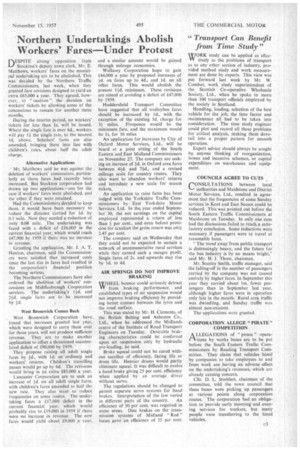Northern Undertakings Abolish Workers' Fares—Under Protest
Page 39

If you've noticed an error in this article please click here to report it so we can fix it.
nESPITE strong opposition from
Stockton's deputy town clerk, Mr. E. Matthews, workers' fares on the municipal undertaking are to be abolished. This was decided by the Northern Traffic Commissioners, last week, when they granted fare revisions designed to yield an extra £65,000 a year. They agreed, however, to " cushion " the decision on workers' tickets by allowing some of the concessions to remain for another three months.
During the interim period, no workers' tickets for less than Is. will be issued. Where the single fare is over 6d., workers will pay 1+ the single rate, to the nearest Id. above. Scholars' fares are also amended, bringing them into line with children's rates, about half the adult charge.
Alternative Applications
Mr. Matthews said he was against the deletion of workers' concessions, particulady as those fares had recently been increased. But Stockton corporation had drawn up two applications—one for the case if workers' fares were abolished, and the other if they were retained.
Had the Commissioners decided to keep them, it would have been necessary to reduce the distance carried for Id. by 0.1 Mile. Now they needed a reduction of only 0.08 mile. The undertaking was faced with a deficit of £16,005 in the current financial year, which would reach £47,900 by 1959 if there was no increase in revenue.
Granting the application, Mr. J. A. T. Hanlort, chairman, said the Commissioners were satisfied that increased costs since the last rise in fares had resulted in the corporation's .financial position becoming serious.
The Northern Commissioners have also ordered the abolition of workers' concessions on Middlesbrough Corporation services. The undertaking's lid, and 2-}d. single fares are to be increased by Id.
West Bromwich Comes Back West Bromwich Corporation have. found that increases granted last year, which were designed to carry them over for three years, will not produce sufficient revenue. They are to make another application to offset a threatened accumulated deficit of 00,000 by 1959.
They propose raising all adult single fares by Id., with Id. on 'ordinary and workers' returns. Children's travelling passes would go up by 6d.' The revisions would bring in an extra £85,000 a year.
Lancaster Corporation are to seek an increase of id. on all adult single fares, with children's fares amended to half thc new rate. They also want to reduce frequencies on some routes. The undertaking faces a £17,000 deficit in the current financial year, which would probably rise to £19,000 in 1959 if there were no increase in revenue. The new fares would yield about £9,000 a year,. and a similar amount would be gained through mileage economies.
Wallasey Corporation hope to gain £44,000 a year by proposed increases of -}cl. on fares up to 4d., and Id. on all other fares. This would abolish the present fld. minimum. These revisions are aimed at avoiding a deficit of £47,000 by 1959.
Huddersfield Transport Committee have suggested that all trolleybus fares should be increased by Id., with the exception of the existing 5d, charge for 3+ miles. Fivepence would be the minimum fare, and the maximum would be Is. for 10 miles
An application for increases by City of Oxford Motor Services, Ltd., will be heard at a joint sitting of the South Eastern and East Midland Commissioners on November 27. The company are seeking an increase of id. in Oxford area fares between 40. and 71d., and a revised mileage scale for country routes. They also want to abandon workers' returns and introduce a new scale for season tickets.
An application to raise fares has been lodged with the Yorkshire Traffic Commissioners byEast Yorkshire Motor Services, Ltd. In the. year ended September 30, the net earnings on the capital employed represented a return of less than + per cent., and even before provision for taxation the gross return was only 2.45 per cent.
The company said on Wednesday that they could not be expected to sustain a network of unremunerative rural services while they earned such a meagre profit. Single fares of 2s. and upwards may rise by ld. to 4d.
AIR SPRINGS DO NOT IMPROVE BRAKING
WHEEL bounce could seriously detract VV from braking performance, and established types of air suspension would not improve braking efficiency by providing better contact between the tyres and the road surface.
This was stated by Mr. H. Clements, of the British Belting and Asbestos Co., Ltd., when he addressed the Midlands centre of the Institute of Road Transport Engineers on Tuesday. Desirable braking characteristics could be conferred upon air suspension only by hydraulic pre-loading, he said.
Brake squeal could not be cured without sacrifice of efficiency, facing life or drum life. Heavier drums would partly eliminate squeal. It was difficult to evolve a hand brake giving 25 per cent. efficiency when applied by an average driver without servo.
The regulations should be changed to permit separate servo systems for hand brakes. Interpretation of the law varied
in different parts of the country. An efficiency of 30 per cent, was required in some areas. Disc brakes on the transmission systems of Midland " Red" buses gave an efficiency of 35 per cent.








































































































